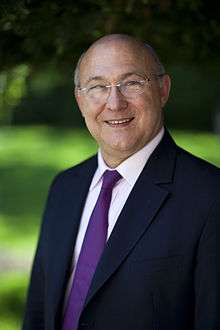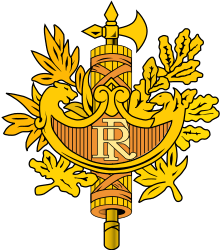Michel Sapin
Michel Sapin (French pronunciation: [mi.ʃɛl sa.pɛ̃]; born 9 April 1952, Boulogne-Billancourt) is a former French politician.[1]
Michel Sapin | |
|---|---|
 | |
| Minister of the Economy, Industrial Renewal and Digital Affairs | |
| In office 30 August 2016 – 10 May 2017 | |
| President | François Hollande |
| Prime Minister | Manuel Valls Bernard Cazeneuve |
| Preceded by | Emmanuel Macron |
| Succeeded by | Bruno Le Maire |
| Minister of Finance | |
| In office 2 April 2014 – 17 May 2017 | |
| President | François Hollande |
| Prime Minister | Manuel Valls Bernard Cazeneuve |
| Preceded by | Pierre Moscovici |
| Succeeded by | Bruno Le Maire |
| In office 2 April 1992 – 29 March 1993 | |
| President | François Mitterrand |
| Prime Minister | Pierre Bérégovoy |
| Preceded by | Pierre Bérégovoy |
| Succeeded by | Edmond Alphandéry |
| Minister of Labour, Employment and Social Dialogue | |
| In office 16 May 2012 – 2 April 2014 | |
| Prime Minister | Jean-Marc Ayrault |
| Preceded by | Xavier Bertrand |
| Succeeded by | François Rebsamen |
| Minister of the Civil Service | |
| In office 28 March 2000 – 7 May 2002 | |
| Prime Minister | Lionel Jospin |
| Preceded by | Émile Zuccarelli |
| Succeeded by | Jean-Paul Delevoye |
| Personal details | |
| Born | 9 April 1952 Boulogne-Billancourt, France |
| Nationality | French |
| Political party | Socialist Party |
| Education | Lycée Henri-IV |
| Alma mater | École normale supérieure Paris-Sorbonne University Sciences Po École nationale d'administration |
He served as Minister of Finance from 1992 to 1993 and from 2014 to 2017, and he was Minister of the Civil Service from 2000 to 2002 and Minister of Labour, Employment and Social Affairs from 2012 to 2014. Sapin, a Socialist, has also served as a member of the National Assembly of France.[2]
After President François Hollande took office, Sapin became the Minister of Labour, Employment and Social Affairs in the government headed by Prime Minister Jean-Marc Ayrault on 16 May 2012.[3] Two years later, he was moved to the post of Minister of Finance under Ayrault's successor, Manuel Valls.
Early life and education
Sapin was born on 9 April 1952 in Boulogne-Billancourt, Hauts-de-Seine, France.[2][4] He attended the Lycée Henri IV, followed by Paris-Sorbonne University, where he received a B.A. in History and an MPhil in Geography.[4] He then attended the École Normale Supérieure, the Institut d'études politiques de Paris, and the École nationale d'administration.[4] He graduated from the ENA as part of the Promotion Voltaire, which also included François Hollande, Dominique de Villepin, Ségolène Royal and Renaud Donnedieu de Vabres.[5] He became an administrative law judge.
Political career
From 1989 to 1994, Sapin served as councillor for Nanterre.[4] From 1995 to 2001, he was the Mayor of Argenton-sur-Creuse.[4] He has served again as such since 2002.[2] He served as Deputy Minister of Justice from May 1991 to April 1992, Finance Minister from April 1992 to March 1993, and Minister of Civil Servants and State Reforms from March 2000 to May 2002.[2]
In 2012 Sapin was appointed Minister of Social Affairs by President Francois Hollande. From April 2014 he then served as head of a newly created ministry dealing with public finances under Prime Minister Manuel Valls.[6]
On August 30, 2016, following the resignation of Emmanuel Macron, the duties of the Minister of the Economy were added to Sapin’s remit. He thus became the Minister for the Economy and Finance.[7][8]
Sapin supported Manuel Valls in the Socialist Party primary of 2017. Following Valls’ defeat to Benoît Hamon, he supported Hamon in the presidential election while also defending Francois Hollande’s record as president.[9][10]
Political positions
In March 2016, Sapin stated his opposition to universal basic income in an interview with France Info.[11]
Personal life
When President Hollande published a list of bank deposits and property held by all 38 ministers for first time 2012,[12] Sapin declared personal assets worth 2 million euros.[13]
In the remainder of the case concerning the indemnities wrongly paid to Sapin while he was mayor of Argenton-sur-Creuse, the administrative court of Limoges by order of 30 March 2017 has just rejected the personal request of Sapin and Of the other elected representatives of Argenton who had formed a third party against the judgment of September 29, 2016.
Bibliography
- L'État en mouvement (2002)
References
- "Subscribe to read". www.ft.com. Retrieved 13 April 2017.
- National Assembly biography
- (in French) Michel Sapin become Minister of Labour in lemonde.fr, 16 May 2012.
- Finance Ministry biography Archived 22 October 2007 at the Wayback Machine
- http://www.lefigaro.fr/politique/2013/04/04/01002-20130404ARTFIG00691-l-incroyable-destin-de-la-promotion-voltaire-de-l-ena.php
- https://www.lesechos.fr/02/04/2014/lesechos.fr/0203416363164_michel-sapin--un-fidele-en-charge-des-comptes-publics.htm
- http://www.lefigaro.fr/flash-actu/2016/08/30/97001-20160830FILWWW00216-michel-sapin-succede-a-emmanuel-macron.php
- http://tempsreel.nouvelobs.com/politique/election-presidentielle-2017/20160830.OBS7133/en-direct-emmanuel-macron-devrait-presenter-sa-demission-du-gouvernement.html
- http://www.parismatch.com/Actu/Politique/Le-gouvernement-face-au-frondeur-Hamon-1177421
- http://www.europe1.fr/politique/sapin-soutient-hamon-mais-linvite-a-defendre-le-quinquennat-2965598
- http://www.numerama.com/politique/152360-michel-sapin-dit-non-revenu-de-base-universel.html
- Catherine Bremer (April 12, 2013), Ministers' wealth list to expose France's "caviar left" Reuters.
- Catherine Bremer and John Irish (April 15, 2013), Wealth inventory exposes millionaires in French government Reuters.
| Political offices | ||
|---|---|---|
| Preceded by Pierre Bérégovoy |
Minister of Finance 1992–1993 |
Succeeded by Edmond Alphandéry |
| Preceded by Émile Zuccarelli |
Minister of the Civil Service 2000–2002 |
Succeeded by Jean-Paul Delevoye |
| Preceded by Xavier Bertrand |
Minister of Labour, Employment and Social Dialogue 2012–2014 |
Succeeded by François Rebsamen |
| Preceded by Pierre Moscovici |
Minister of Finance 2014–2017 |
Succeeded by Bruno Le Maire |
| Preceded by Emmanuel Macron |
Minister of the Economy, Industry and Digital Affairs 2016–2017 | |
